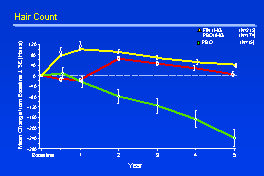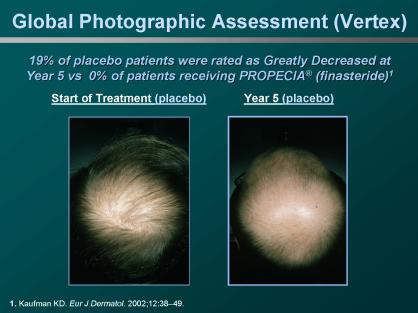| Frequently Asked Questions About Propecia®
• What is Propecia®?
• What is DHT?
• How does Propecia® work?
• When is the best time to "start" Propecia®?
• Does Propecia® have any side-effects?
• Can Propecia® affect your fertility (i.e.- affect your ability to have children)?
• Is there any risk to an unborn child if a male is taking Propecia®?
• Does Propecia® affect my prostate?
• Who Should Not Take Propecia®?
• Does Propecia® work for all men?
• How effective is Propecia® at "regrowing hair" in the balding area?
• How long will it take for Propecia® to work?
• If Propecia® effective in "Older Men"?
• How long do I have to take Propecia®?
• Does Propecia® interact with other medications?
• Why is Propecia® preferred over other products available for the treatment of hair loss?
• Would using a form of Minoxidil in combination with Propecia® be more effective that Propecia® alone?
• How should I take Propecia®?
• How should I store Propcia®?
1. What is PROPECIA?
Propecia® is the first pill that effectively treats male pattern hair loss on the vertex (at top of head) and anterior mid-scalp area. Propecia® is an oral medication that you take once a day, with or without food, with or without medication, morning or night-it just doesn't matter. You just need to take it. Propecia® (finasteride), available only by prescription, is an exciting weapon in the battle against male pattern hair loss. Propecia® is for use by MEN ONLY and should NOT be used by women or children.
2. What is DHT?
DHT (DiHydroTestosterone) is one of many male hormones in the body. DHT is developmentally important early in a male fetus; however, as an adult it appears to cause-
• prostate enlargement
• acne
• male pattern baldness.
• Hair growth (unfortunately in the ears, nose and back)
Most men do not want any of the above problems.
DHT is believed to contribute to male pattern baldness by:
• Shortening of the growing phase of the hair
• Progressive miniaturization of hair follicles
• Decreasing the number of visible hairs.
• How does Propecia® work?
Propecia® works by inhibiting 5-Reductase, which inhibits the formation of DHT, the hormone that causes hair loss. Most importantly , Propecia® helps grow natural hair, not just "peach fuzz," and is as convenient to take as a vitamin: one pill a day. Approximately 80% of Dr. McAndrews' hair transplant patients are taking Propecia®
• When is the best time to start Propecia®?
It is best to start Propecia® as soon as possible at the onset of androgenetic alopecia. By delaying starting Propecia® even a year, the below study showed that patients will never catch back up to patients that started at the beginning.

• The yellow line represents patients on Propecia® for 5 years and you can see they had a significant increase in their hair counts
• The green line represents the placebo patients over 5 years and you can see they had progressive decrease in hair counts over 5 years.
• The red line represents patients placed on a placebo for 1 year with progressive loss in hair counts, then they were switched over to Propecia® a they had a increase in their hair counts however they never caught up to the patients who were started on Propecia® from the start.
It is similar to tooth decay; it is best to brush your teeth early before you have much "tooth decay". If you have no teeth left in your mouth, brushing your teeth is not effective.
The below picture is a patient that was placed on placebo for 5 straight years and his hair loss is dramatic. He will never be able to catch back up to where he would have been if he had started on Propecia® 5 years ago. If he had started on Propecia® 5 years ago, statistically he would have a 90% chance of having as much, if not more, hair then he did 5 years before.

5. Does Propecia® have any side effects?
Propecia® has an excellent safety profile. In matter of fact, in the study group- more patients on Placebo (a sugar tablet) (1.6%) stopped from side effects than did the patients taking Propecia®(1.4%). Dr. McAndrews feels that the side effects of Propecia® are blown out of proportion by the unethical "scam" companies and by unethical hair transplant surgeons that don't want you using Propecia®, but instead want you to purchase their products or services.
A very small number of men experienced certain sexual side effects at 1 year(and much of the side effects were related to the "Placebo Effect"), such as:
1 YEAR |
PROPECIA® |
Placebo |
Decreased Libido (less desire for sex) |
1.8% |
1.3% |
Erectile Dysfunction (difficulty achieving an erection) |
1.3% |
0.7% |
Ejaculation Disorder (primarily decreased volume of ejaculate) |
1.2% |
0.7% |
These side effects were reversible and went away in all men who stopped taking Propecia®. These side effects also disappeared in most men (58%) who continued taking Propecia®.
At 5 years the side-effects decreased further to the point that you have a greater chance to be hit by a bus.
5 YEARS |
PROPECIA® |
Placebo |
Decreased Libido (less desire for sex) |
0.3% |
0% |
Erectile Dysfunction (difficulty achieving an erection) |
0.3% |
0% |
Ejaculation Disorder (primarily decreased volume of ejaculate) |
0% |
0% |
In clinical studies with Propecia®, there was not an increased incidence of breast tenderness/swelling and allergic reactions such as lip swelling and rash men taking Propecia® as compared to placebo. Caution should be used in the administration of Propecia® in patients with liver function abnormalities, as finasteride is metabolized extensively in the liver.
In the study group, Propecia® did not appear to affect hair in places other than the scalp. Propecia® can affect a blood test called PSA (Prostate-Specific Antigen) for the screening of prostate cancer. If you have a PSA test done, you should tell your doctor that you are taking Propecia®.
6. Can Propecia® affect your fertility (i.e.- affect your ability to have children)?
Absolutely not. Propecia® is quite safe. Propecia® does not affect your ability to have a child (i.e.- your fertility). Extensive studies show Propecia® does not effect sperm concentration, sperm motility, or sperm morphology. Therefore, Propecia® does not affect spermatogenesis or semen production in men and will not effect your ability to have children.
7. Is there any risk to an unborn child if a male is taking Propecia®?
Exposure of pregnant women to the semen of men who are taking Propecia® is not a risk to the fetus . Dr. McAndrews has some patients who are afraid that their Propecia® tablets cannot be in the same house as their pregnant wives. Propecia® tablets are sugar-coated and therefore handling these tablets by a pregnant female is not a risk. A pregnant female shouldn't handle broken tablets.
There is no study showing that there is a risk to the fetus if the father is taking Propecia®. Semen levels have been measured in 35 men taking Propecia® daily for 6 months. In 60% of the samples, Propecia® levels were undetectable. The mean Propecia® level was 0.26 ng/mL, and the highest level measured was 1.52 ng/mL. Using the highest semen level measured and assuming 100% absorption from a 5 mL ejaculate per day volume, human exposure through vaginal absorption would be 750 times lower than the exposure from the no-effect dose for developmental abnormalities in male Rhesus monkeys. There were no developmental abnormalities seen in male Rhesus monkey fetuses when Propecia® was given intravenously (into the blood stream) to pregnant Rhesus monkeys at 750 times the estimated exposure of pregnant women from men taking 1 mg/day.
8. Does Propecia® affect my prostate?
The active ingredient in Propecia®, finasteride, has been used for numerous years at 5 times the dose to treat prostate enlargement (BPH) and no long-term side effects on the prostate have every been shown. In matter of fact, there is an ongoing study looking at the potential decrease in risk of prostate cancer in men taking the active ingredient in Propecia®. The one thing to be aware of is Propecia® can lower the PSA in male adults. This is a blood test that is used to screen for prostate cancer in older men, usually above 50 years old. The test is still just as accurate in men on Propecia®.
9. Who should not take Propecia®?
Propecia® is for the treatment of male pattern hair loss in MEN ONLY.
Women and children should not take Propecia®.
Women who are pregnant or may potentially become pregnant should not take Propecia® because it may cause abnormalities of the external genitalia of a male fetus. Propecia® tablets are sugar coated and will prevent contact with the active ingredient during normal handling, provided that the tablets have not been broken or crushed.
Anyone allergic to any of the ingredients should not take Propecia®.
10. Does Propecia® work for all men ?
Yes, Dr. McAndrews believes it works in all men. Some men get greater benefit than others for unknown reasons. The studies did not show any differences in the various ethnic groups.
11. How effective is Propecia® at "Regrowing" hair in the balding area?
Propecia® works the best on the back of your scalp or the vertex. 66% percent of men had some re-growth in the vertex and 99% had no further hair loss at 2 years.
Of the patients who had improvement in the balding vertex in the 2 year study, the results were broken down into 1) great improvement, 2) moderate improvement, and 3) slight improvement.
5% of the men had great improvement (show before and after)
31% of the men had moderate improvement (show before and after)
30% of the men had slight improvement (show before and after)
At 5 years, 90% still had no further hair loss or re-growth in the vertex, while 100% on placebo had significantly less hair. There was a 277 hair per circular inch difference in the patients taking Propecia® vs. the patients taking the placebo over 5 years, this is approximately a 20% density difference.
Propecia® does not work as well in the anterior-mid scalp as the vertex. But still 42% get some re-growth and 95% had no further hair loss at 2 years. (See picture break down of the results) Unfortunately, no studies have shown Propecia® can cause re-growth of hair in front of the frontal hairline.
PROPECIA RESULTS The following results are from a 2-year VERTEX study of patients taking Propecia® conducted by Merck. The study results were categorized as greatly into 4 groups: 1) Great Improvement 2) Moderate Improvement 3) Slight Improvement 4) No improvement.
5% of the study patients received great improvement like the results below:

31% of the study patients received moderate improvement like the results below:

30% of the study patients received slight improvement like the results below:

34% of the study patients had no improvement.
As you can see, a majority of the patients in the 2 year Vertex study not only did not have any further hair loss, but had significant hair "regrowth" in balding area. In my personal experience there is not another medical treatment that compares to these results.
Presently Propecia® is by far the best medical treatment for male pattern baldness and the results of the 5 year study showed the difference in hair counts between Propecia® versus the Placebo group continued to increase.
12. Does Propecia® work in older men?
Yes this has been studied in older men showing much benefit. There was a 2 year study of approximately 300 men from 42-60 years old (Norwood 2-5). The results were-
• 94% were doing as good or better than they were before start of study
• 39% were improved
• Slight increase in side effects, however no increase in patients discontinuing due to side effects compared to original study
• PSA decreased by approximately 30%
There results were not as dramatic as the the 18-41 year old age group, but still was quite effective .
13. How long will it take for Propecia® to work?
Propecia® begins to block the formation of DHT almost immediately; however, because hair grows slowly, visible results from Propecia® take some time. In clinical trials, most men began to see the first benefit of Propecia® - slowing hair loss - as early as 3 months. However visible improvement comes very slowly of a few years.
The below pictures represent a patient's progress on Propecia® for 2 years. You can see there is very little visible improvement at 6 months. However the improvement a 2 years is great. If this patient had stopped Propecia® at 6 months he would have lost out on all the results.
Image Table
Start of Propecia 1 year 3 years
The patient is definitely improved at 1 year, however the cosmetically he is doing much better at 3 years. Therefore, it is important to be patient when it comes to results
Therefore, Dr. McAndrews tells all of his patients not to judge the results of Propecia® for at least1 year, because he has had many patients that were not showing much results at 6 months but by 1 year the results were significant. Hair weight studies are showing the hair weight in the balding area does not peak out for 2-3 years which goes along with many of my patients not seeking maximum improvement for 2-3 years.
14. How long do I have to take Propecia®?
When patients ask Dr. McAndrews how long they need to take propecia, he responds by asking them how long to they need to continue to brush their teeth. Toothpaste is not perfect, but it can stop or delay the onset of "tooth decay". Just like Propecia® can stop or delay the onset of "hair decay". If you stop using toothpaste you will develop cavities and lose the benefit. If you stop Propecia® you will loose its benefit over the next year or two.
You need to take Propecia® for as long as you want to continue to benefit from use. If you stop taking Propecia®, you will likely lose any hair you have gained in 18-24 months of stopping treatment.
15. Does Propecia® interact with other medications?
No drug interactions of clinical importance have been identified. Finasteride does not appear to affect the cytochrome P450-linked drug metabolizing enzyme system. Compounds that have been tested in man include antipyrine, digoxin, propranolol, theophylline, and warfarin and no interactions were found. Although specific interaction studies were not performed, finasteride doses of 1 mg or more were concomitantly used in clinical studies with acetaminophen, a-blockers, analgesics, angiotensin-converting enzyme (ACE) inhibitors, anticonvulsants, benzodiazepines, betablockers, calcium-channel blockers, cardiac nitrates, diuretics, H2 antagonists, HMG-CoA reductase inhibitors, prostaglandin synthetase inhibitors (NSAIDs), and quinolone anti-infectives without evidence of clinically significant adverse interactions.
16. Why is Propecia® preferred over other products available for the treatment of hair loss?
In my personal experience, there is no other medication on the market, prescription or over-the-counter, that comes close to the effectiveness of Propecia®. Another huge benefit is ease of use. You only have to take one pill per day, which for most patients is very manageable.
17. Would using a form of Minoxidil in combination with Propecia® be more effective than Propecia® alone?
Theoretically Dr. McAndrews would say, YES. We constantly see in dermatological diseases using a combination of medications with different mechanism of action, works better than either one when used alone. Propecia® and Minoxidil work on different mechanisms of action.
There was a study looking at the Stumptail macaque Monkey, who appears to have a similar hair loss pattern of balding as humans. There were three study groups of monkeys; one group of monkeys was treated with Minoxidil alone, another group of monkeys were treated with Propecia® alone, and the last group of monkeys was treated with both Propecia® and Minoxidil. The monkeys who had both Propecia® and Minoxidil grew significantly more hair than the monkeys that had a single form of treatment. There was a small study presently performed on humans which both patients and physicians felt the results were better than either medication alone. Propecia® was also judged as being better than Minoxidil alone.
18. How should I take Propecia®?
Taken once a day in tablet form, Propecia® is simple, easy, and - most importantly - clinically demonstrated to be effective in most men. Propecia® helps grow natural hair - not just "peach fuzz" - and is as convenient to take as a vitamin: one pill a day.
Propecia® may be taken with or without meals and with or without other medications.
If you forget to take Propecia®, do NOT take an extra tablet. Just take the next tablet as usual.
Propecia® will not work faster or better if you take it more than once a day.
19. How should I store Propecia®?
Keep Propecia® in the original container and keep the container closed. Store it in a dry place at room temperature. Propecia® tablets are coated and will prevent contact with the active ingredient during normal handling, provided that the tablets are not broken or crushed. Do not give your Propecia® tablets to anyone else. It has been prescribed only for you. Keep Propecia® and all medications out of the reach of children. |




